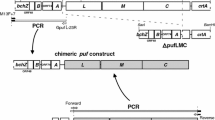Abstract
Serratia marcescens SM-6 when starved for a required amino acid stops synthesizing protein and RNA and accumulates two nucleotides which cochromatograph with ppGpp and pppGpp. These features are characteristic of bacterial strains with stringent RNA control (rel +). Two independent mutants were isolated which resemble relaxed (relA) mutants ofEscherichia coli; they continue to synthesize RNA and accumulate neither ppGpp nor pppGpp when deprived of the required amino acid. The extracellular enzyme activities (nuclease, protease, lipase) of the relaxed mutants are about the same as those of the parental stringent strain when studied under standard growth conditions. Exoenzyme-deficient (nuc; prt) and exoenzyme-hyperproducing (nuc su) mutants were isolated from both stringent and relaxed strains ofS. marcences SM-6 and no change of the cellular ability to form ppGpp and pppGpp could be observed. From these results it appears that the formation of exoenzymes ofS. marcescens SM-6 is independent of stringent/relaxed RNA control.
Similar content being viewed by others
Abbreviations
- cpd :
-
cyclic nucleotide phosphodiesterase deficient
- nuc :
-
nuclease deficient
- nuc su :
-
nuclease hyperproducing
- prt :
-
protease deficient
- rel :
-
relaxed control
- spo :
-
ppGpp deficient (spot less)
- ppGpp:
-
guanosine tetraphosphate
- pppGpp:
-
guanosine pentaphosphate
- TCA:
-
trichloroacetic acid
- OD:
-
optical density
- EU:
-
enzyme units
References
Cashel, M.: The control of ribonucleic acid synthesis inEscherichia coli. IV. Relevance of unusual phosphorylated compounds from amino acid-starved stringent strains. J. Biol. Chem.244, 3133–3141 (1969)
Cashel, M.: Regulation of bacterial ppGpp and pppGpp. Ann. Rev. Microbiol.29, 301–318 (1975)
Cashel, M., Gallant, J.: Two compounds implicated in the function of the RC gene ofEscherichia coli. Nature (Lond.)221, 838–841 (1969)
Cashel, M., Kalbacher, B.: The control of ribonucleic acid synthesis inEscherichia coli. V. Characterization of a nucleotide associated with the stringent response. J. Biol. Chem.245, 2309–2318 (1970)
Cashel, M., Lazzarini, R. A., Kalbacher, B.: An improved method for thin-layer chromatography of nucleotide mixtures containing32P-labeled orthophosphate. J. Chromatogr.40, 103–109 (1969)
Coleman, G., Brown, S., Stormonth, D. A.: A model for the regulation of bacterial extracellular enzyme and toxin biosynthesis. J. Theor. Biol.52, 143–148 (1975)
Diderichsen, B., Fiil, N. P., Lavallé, R.: Genetics of therelB locus inEscherichia coli. J. Bacteriol.131, 30–33 (1977)
Fiil, N., Friesen, J. D.: Isolation of “relaxed” mutants ofEscherichia coli. J. Bacteriol.95, 729–731 (1968)
Freundlich, M.: Cyclic AMP can replace therelA-dependent requirement for derepression of acetohydroxy acid synthase inE. coli K-12. Cell12, 1121–1126 (1977)
Friesen, J. D., Fiil, N. P., Parker, J. M., Haseltine, W. A.: A new relaxed mutant ofEscherichia coli with an altered 50S ribosomal subunit. Proc. Nat. Acad. Sci (Wash.)71, 3465–3469 (1974)
Gallant, J., Lazzarini, R. A.: The regulation of ribosomal RNA synthesis and degradation in bacteria. In: Protein synthesis — A series of advances. Vol. 2. (E. H. McConkey, ed.), pp. 309–359. New York: M. Dekker 1976
Laffler, T., Gallant, J.:SpoT, a new genetic locus involved in the stringent response inE. coli. Cell1, 27–30 (1974)
Lavallé, R.: Nouveaux mutants de régulation de la synthèse de l'ARN. Bull. Sco. Chim. Biol.47, 1567–1570 (1965)
Lavallé, R., De Hauwer, G.: Messenger RNA synthesis during amino acid starvation inEscherichia coli. J. Mol. Biol.37, 269–288 (1968)
Martin, R. G.: Polarity in relaxed strains ofSalmonella typhimurium. J. Mol. Biol.31, 127–134 (1968)
Nunn, W. D., Cronan, J. E., Jr.:Rel gene control of lipid synthesis inEscherichia coli. Evidence for eliminating fatty acid synthesis as the sole regulatory site. J. Biol. Chem.249, 3994–3996 (1974)
Nunn, W. D., Cronan, J. E., Jr.: Evidence for a direct effect on fatty acid synthesis inrelA gene control of membrane phospholipid synthesis. J. Mol. Biol.102, 167–172 (1976)
Pao, C. C., Gallant, J.: A gene involved in the metabolic control of ppGpp synthesis. Molec. Gen. Genet.158, 271–277 (1978)
Parker, J., Watson, R. J., Friensen, J. D., Fiil, N. P.: A relaxed mutant with an altered ribosomal protein L11. Molec. Gen. Genet144, 111–114 (1976)
Pedersen, S., Kjeldgaard, N. O.: Arel gene control oflac gene transcription in vivo. In: Alfred Benzon Symposium IX, Control of ribosome synthesis. (N. O. Kjeldgaard, O. Maaløe, eds.), pp. 164–165, Munksgaard: Copenhagen, 1976
Stent, G. S., Brenner, S.: A genetic locus for the regulation of ribonucleic acid synthesis. Proc. Nat. Acad. Sci. (Wash.)47, 2005–2014 (1961)
Sussman, A. J., Gilvarg, C.: Protein turnover in amino acid-strarved strains ofEscherichia coli K-12 differing in their ribonucleic acid control. J. Biol. Chem.244, 6304–6308 (1969)
Winkler, U.: Mutants ofSerratia marcescens defective or superactive in the release of a nuclease. In: Molecular genetics (H. G. Wittmann, H. Schuster, eds.), pp. 187–201 Berlin, Heidelberg, New York, Springer 1968
Winkler, U., Heller, K. B., Folle, B.: Pleiotropic consequences of mutations toward antibiotic-hypersensitivity inSerratia marcescens. Arch. Microbiol.116, 259–268 (1978)
Winkler, U., Scholle, H., Bohne, L.: Mutants ofSerratia, marcescens lacking cyclic nucleotide phosphodiesterase activity and requiring cyclic 3′, 5′-AMP for the utilization of various carbohydrates. Arch. Microbiol.104, 189–196 (1975)
Winkler, U., Timmis, K.: Pleiotropic mutations inSerratia marcescens which increase the synthesis of certain exocellular proteins and the rate of spontaneous prophage induction. Molec. Gen. Genet.124, 197–206 (1973)
Yang, H.-L., Zubay, G., Urm, E., Reiness, G., Cashel, M.: Effects of guanosine tetraphosphate, guanosine pentaphosphate, and β, γ methyl-guanosine pentaphosphate on gene expression ofEscherichia coli in vitro. Proc. Nat. Acad. Sci. (Wash.)71, 63–67 (1974)
Author information
Authors and Affiliations
Rights and permissions
About this article
Cite this article
Bohne, L., Winkler, U. Relaxed mutants ofSerratia marcescens SM-6. Biochemical traits and relevance of therel + allele for the formation of exoenzymes. Arch. Microbiol. 121, 181–186 (1979). https://doi.org/10.1007/BF00689984
Received:
Issue Date:
DOI: https://doi.org/10.1007/BF00689984




